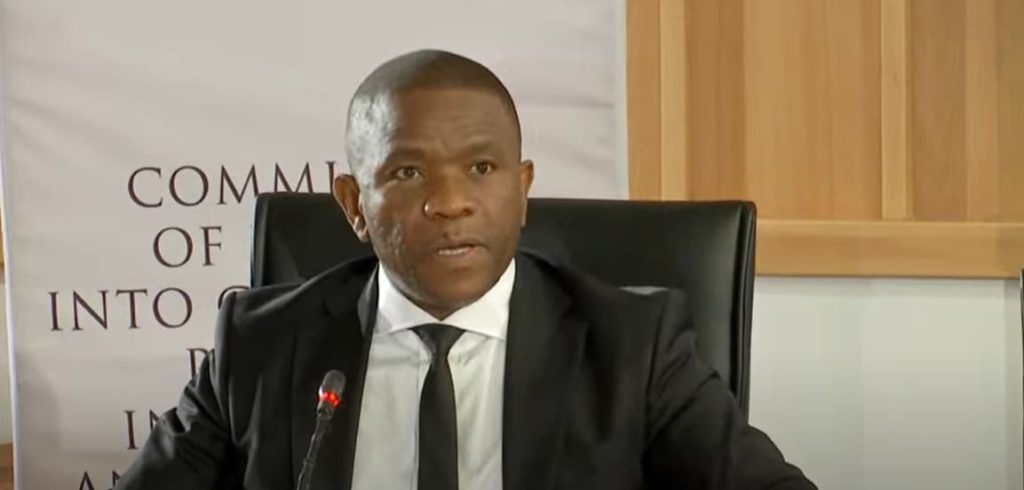By Makhosazana Radebe
The opening of the Judicial Commission of Inquiry into Criminality, Political Interference and Corruption in the Criminal Justice System last week was meant to signal a turning point: a chance to confront long-simmering claims of political interference, criminal infiltration, and corruption at the very heart of South Africa’s justice system. Yet the road to the hearings has been anything but smooth, raising as many questions as it seeks to answer.
A Commission Born in Crisis
When KwaZulu-Natal Police Commissioner Nhlanhla Mkhwanazi went public earlier this year with allegations of mafia-like networks operating inside policing and intelligence structures, the shockwaves rippled through every arm of government. His claims of criminal syndicates, compromised officers, and politicians meddling in investigations struck a nerve with a public already jaded by state capture and years of declining trust in law enforcement.
President Cyril Ramaphosa responded by establishing the Madlanga Commission in July, appointing retired Constitutional Court Justice Mbuyiseli Madlanga to lead it. The brief: to expose the rot, recommend reforms, and if necessary, set the stage for prosecutions.
Delays That Fuel Doubt
Before the first witness could even be called, the Commission hit turbulence. Hearings originally planned for September 1 were postponed due to the Department of Justice’s failure to secure critical ICT infrastructure. The resulting suspension of senior officials, including the department’s director-general, only deepened public suspicion.
Civil society groups and opposition MPs warned that every week of delay risked evidence being tampered with and witnesses being silenced. In a country haunted bypolitical assassinations and whistleblower murders, such fears are not idle speculation.
Who Has the Most to Lose?
For law enforcement officials on the ground, the inquiry is both vindication and risk. Some see it as a long-overdue cleansing process that could dismantle networks protecting drug lords, extortion gangs, and corrupt politicians. Others fear becoming expendable; pawns in a political chess game that may end careers but not necessarily reform institutions.
Politically, the stakes are enormous. The suspended Minister of Police Senzo Mchunu’s name already hovers over the proceedings. Should the Commission confirm Mkhwanazi’s allegations of ministerial interference, it could trigger seismic shifts in cabinet and ruling-party dynamics.
Lessons From the Past
For many South Africans, the Madlanga Commission evokes déjà vu. The Zondo Commission into state capture exposed extraordinary levels of graft, but accountability since then it has been slow and questionable. The public’s guarded optimism is tempered by skepticism: will this commission end differently, or will its findings gather dust?
The Human Cost
Beyond the politics and procurement battles lies a deeper human story. Ordinary South Africans, those who rely on police to respond to gender-based violence, robberies, or taxi violence, live daily with the consequences of compromised institutions.
In Umlazi, Durban, resident Siphokazi Dlamini described her frustration: “When we call the police after a break-in, sometimes they arrive hours later, if at all. If criminals are sitting inside the system, who do we trust to protect us?”
Similarly, Sandile Zulu, a father of two, said safety feels like a lottery: “We hear about gangs running the streets and politicians fighting over police contracts. Meanwhile, in our community, bullets fly and kids can’t walk to school safely. This Commission must deliver something real, not just talk.”
In Pietermaritzburg, Thandeka Ngubane, who lost her cousin to gender-based violence, was blunt: “We’ve had commissions before. We’ve had promises. Until people are jailed for corruption and until police take our calls seriously, these are just words. Justice for us is action, not speeches.”
A Narrow Window of Trust
With a budget of R147.9 million and only six months to deliver findings, the Madlanga Commission has little room for missteps. An interim report is expected before the end of the year, offering the first clues as to whether it will deliver more than rhetoric.
For Justice Madlanga, the task is monumental: to probe the most sensitive corners of the state, restore public trust, and chart a path for reform in a system where reform has too often been promised and postponed.
South Africans have seen commissions rise and fall before. This time, many are hoping not just for another report, but for a reckoning.

